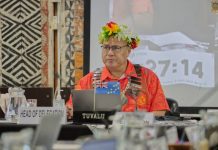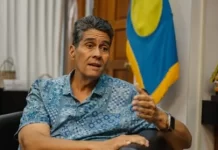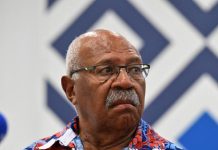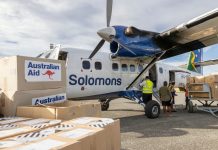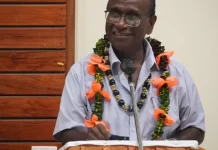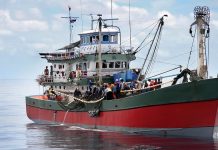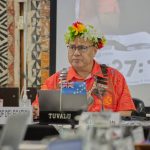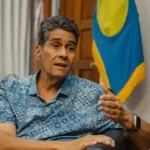United States President Biden Joe Biden welcomes Australian Prime Minister Anthony Albanese on 25 October 2023 for an official visit in Washington D.C this week.
The two leaders reaffirmed the strength of the U.S-Australia alliance and the evolution of its reach beyond defence and security into a force for increased prosperity and innovation across the Indo-Pacific region and around the world.
Following the U.S-Pacific Islands Forum Summit, the U.S and Australia reaffirmed their intention to work through existing regional architecture, including the Pacific Islands Forum as the Pacific’s pre-eminent institution, to meet the region’s needs and aspirations, including as articulated in the 2050 Pacific Strategy for the Blue Pacific Continent.
Together, Australia and the United States plan to support a range of projects and activities intended to support inclusive, climate-resilient economic development across the region, in consultation with the Pacific Islands Forum, regional organisations and likeminded partners to ensure coordination across programs and countries.
Enhancing Digital Connectivity: As part of our Partnership for Global Infrastructure and Investment, the United States is engaging with Google to scale a series of significant private-sector consortium investments in subsea cables to provide the expansion of sustainable and reliable internet infrastructure to Pacific Island Countries. In consultation with our Pacific Island counterparts, Australia and the United States intend to work together to support connection by Pacific Islands to international commercial subsea cable systems under development. Together our countries plan to invest a total of US$65 million in support of enhancing secure, resilient connectivity in the Pacific Islands by working with Google, APTelecom, and Hawaiki Nui to provide branching units for the Federated States of Micronesia, Kiribati, Marshall Islands, Nauru, Papua New Guinea, Solomon Islands, Timor Leste, Tuvalu and Vanuatu.
Australia will provide US$50 million through the Australian Infrastructure Financing Facility for the Pacific to support future primary and redundancy connectivity options for Pacific Island countries. This builds on existing investments by Australia and the United States, as well as other Quad partners in telecommunications infrastructure in the region, including U.S plans to work with Congress to expand the U.S Pacific Islands Infrastructure Initiative announced at the U.S-Pacific Islands Forum Summit.
Working with Congress, the United States, under the State Department’s Digital Connectivity and Cybersecurity Partnership (DCCP), intends to support expanding access to fast, secure, interoperable, and reliable internet connectivity in Pacific Island countries by increasing the initial US$3 million allocation to $5 million, followed by an additional US$10 million in subsequent years to support Google’s South Pacific Connect subsea cable initiative. This US$15 million supports the initial investment of up to US$3 million announced by the United States in September for a USTDA feasibility study for the proposed Central Pacific Cable led by APTelecom.
Building Cyber Resilience: As members of the Partners in the Blue Pacific (PBP), we are working together with other member countries to deliver practical, tangible results in support of Pacific priorities. Consulting the Pacific and listening to their unique needs, the United States and Australia seek to provide practical, integrated solutions that deliver trusted and secure connectivity and climate resilient infrastructure, from cable through to cloud. This work will be undertaken in close consultation with the Pacific Islands Forum and coordinating contributions from other PBP Partners and industry.
Together, the United States and Australia intend to engage Pacific Island nations and the private sector to explore developing and deploying a pilot initiative in the region to increase national cyber resilience. This pilot initiative could help protect and back up government data by upgrading data services, including through implementation of cloud-based solutions to store government records.
Expanding Access to Finance: Access to finance across the Pacific Islands for both governments and the private sector is important to support a vibrant and resilient region which is still recovering from the economic costs of the COVID-19 pandemic.
The United States and Australia remain committed to evolving Multilateral Development Banks to better address global challenges as part of their contribution to reducing poverty, boosting sustainable and inclusive growth, and helping achieve the Sustainable Development Goals. We commit to raising the level of ambition to deliver more headroom and concessional finance to boost the World Bank’s capacity to support low- and middle-income countries in addressing global challenges and to provide strong support for the poorest countries. The United States and Australia will step up efforts to this end. Both countries continue to cooperate through the World Bank and Asian Development Bank to promote transparent, high-quality investment, including use of competitive procurement focused on value for money and strong development outcomes, that creates more opportunities for local employment and skills development across the Indo-Pacific, particularly the Pacific Islands.
The United States and Australia also remain committed to working with Pacific Island countries to maintain access to enduring banking services. Today, we jointly launch a new Pacific Banking Forum, in consultation with Pacific Island countries, to bring together our public and private sectors to address the causes of de-risking, and we affirm our plan to provide new and additional technical assistance to improve the region’s access to financial services. We further intend to work with the Pacific to address the costs and accessibility of correspondent banking relationships, including by addressing jurisdiction-specific challenges and exploring regional approaches to aggregate payment flows, as appropriate.
Australia welcomed the U.S. announcement at the U.S-Pacific Islands Forum Summit that the United States intends to launch an up to US$50 million flexible Microfinance Facility to expand access to finance in the Pacific Islands, and Australia and the United States look forward to opportunities to partner with Pacific Island countries to improve access to finance and banking services for the region’s private sector.
Improving Quality, High Standard Infrastructure Access: The United States and Australia intend to pursue joint financing to help modernise and secure infrastructure in the region and are committed to working with regional organisations and mechanisms like the Pacific Region Infrastructure Facility and other initiatives such as the Partnership for Global Infrastructure and Investment and the Trilateral Infrastructure Partnership with Japan that promote and maintain high standards, including on labor and environmental practices. The two countries have also joined with Japan, Spain, and the UK to implement the Blue Dot Network infrastructure initiative.
As part of the announcement at the U.S-Pacific Islands Forum Summit to expand the Pacific Islands Infrastructure Initiative, the United States and Australia plan to co-finance critical maritime infrastructure in Kiribati, including the rehabilitation of Kanton Wharf and Charlie Wharf in Tarawa, subject to Congressional notification.
Australia intends to provide over US$300,000 to support a Blue Dot Network Secretariat to enable transparent, sustainable, and quality infrastructure projects.
Australia welcomed the recent opening of the U.S Agency for International Development (USAID) Pacific Islands Mission in Suva and the USAID Papua New Guinea, Solomon Islands, and Vanuatu Country Representative Office in Port Moresby. To strengthen our bilateral development cooperation, USAID and the Department of Foreign Affairs and Trade (DFAT) are exploring arrangements to strengthen organisational interoperability, knowledge sharing and officer-to-officer links.
Enhancing Defence and Security Cooperation
U.S. and Australian forces have fought side-by-side in pursuit of freedom, democracy, rule of law, and peace and stability for more than one hundred years, in every major conflict since World War I. Together, our two countries have taken numerous steps to pave the way for closer defense and security ties. The announcements below continue to build on this pillar of our alliance.
Tackling the Climate Crisis: Achieving the goals of the Paris Agreement and our 2030 emissions reduction targets will require concerted, whole-of-government efforts at home and with our international partners.
President Biden and Prime Minister Albanese underscored the imperative of addressing non-CO2 pollutants as a key driver of global climate change. Together, the United States and Australia will continue to take strong action at home on methane mitigation and consider opportunities to support developing countries in the Indo-Pacific with capacity building assistance on methane mitigation.
Together, we are committed to supporting the Montreal Protocol’s Multilateral Fund’s work to enhance support for early action to reduce HFC consumption and for improved energy efficiency for the HCFC phase-out and HFC phase-down in order to maximize the climate benefits of Montreal Protocol implementation.
The U.S Environmental Protection Agency and the Australian Department of Climate Change, Energy, the Environment and Water have signed a Memorandum of Understanding to support the establishment of Environment Protection Australia, Australia’s new national environment protection agency and to promote bilateral cooperation on environmental protection.
The United States and Australia are working to jointly develop an Indo-Pacific Net-Zero Transition bond series that will mobilise funding for small and medium sized enterprises with a focus on clean energy transition.
Recognising the disproportionate impacts of climate change on Pacific island countries, and building on the leaders’ commitment in May to support Pacific-led initiatives to enhance climate change mitigation, adaptation and mitigation efforts, Australia and the United States intend to further explore a meaningful contribution to the Pacific Resilience Facility, once the design and other arrangements have been finalized, as a Pacific Island Forum-led and member-owned Facility that will build climate and disaster resilience.
In addition, the United States and Australia will work to enhance access to the resources of the Green Climate Fund, and other relevant multilateral funds, especially for those most vulnerable to the adverse effects of climate change, including least developed countries (LDCs) and small island developing states (SIDS). This effort will be advanced, including through targeted bilateral technical assistance from USAID to LDCs and SIDS and in coordination with DFAT’s program of support to Pacific Island countries.
The United States welcomed Australia’s bid to host COP31 in 2026 in partnership with Pacific Island Countries.
Advancing Research: U.S and Australian research partnership continues to drive forward research which supports work on clean energy and addressing the climate crisis, as well as critical minerals. The U.S NSF and Australia’s CSIRO have established a new partnership with NSF’s Global Centres initiative with US$16.3 million for climate and clean energy research partnerships between the United States and Australia.
Advancing cooperation on Natural Capital Accounting, Environmental-Economic Accounts and Related Statistics and Nature-based Solutions: The United States and Australia released a joint statement to advance cooperation on Natural Capital Accounting, Environmental-Economic Accounts and Related Statistics, and Nature‑based Solutions in December 2022 and convened a Senior Officials Dialogue in September 2023. Collaboration will occur through technical working group meetings over the course of the next year to share ongoing efforts to develop natural capital accounts that track natural resources, including air, land, water, marine systems, and forests. Senior Officials plan to continue the dialogue in October 2024 alongside Australia’s Global Nature Positive Summit in Sydney.
Advancing science-based approaches to ocean-based climate action and a sustainable ocean economy: As partners in the High Level Panel for a Sustainable Ocean Economy, the United States and Australia partner on multiple efforts to advance ocean-based solutions to climate change, pioneer protection and restoration of blue-carbon habitats, improve Indigenous peoples’ role in ocean decision-making, integrate Indigenous Knowledge into ocean science and marine management, and align equity, prosperity and effective conservation as anchors for sustainable ocean use.
Enhancing Coordination: The United States and Australia intend to finalise a Memorandum of Understanding to co-locate a U.S energy attaché with DCCEEW. Together, our teams are working on a daily basis to advance our mutual climate and clean energy goals.
Raising Up All Voices in the Energy Transition: To invest in the next generation of women leaders in the energy sector the United States and Australia are hosting an Equality in Energy Transitions Ambassador Program Roundtable focused on policies to accelerate the participation of women in the clean energy workforce.
Cooperation through the Quad: Australia and United States are also working through the Quad to accelerate the clean energy transition and the development of secure and diversified clean energy supply chains in the Indo-Pacific, including over US$30 million of grant funding from Australia to support research and development, and feasibility studies for new clean energy manufacturing projects in the Indo-Pacific.
SOURCE: WHITE HOUSE/PACNEWS


